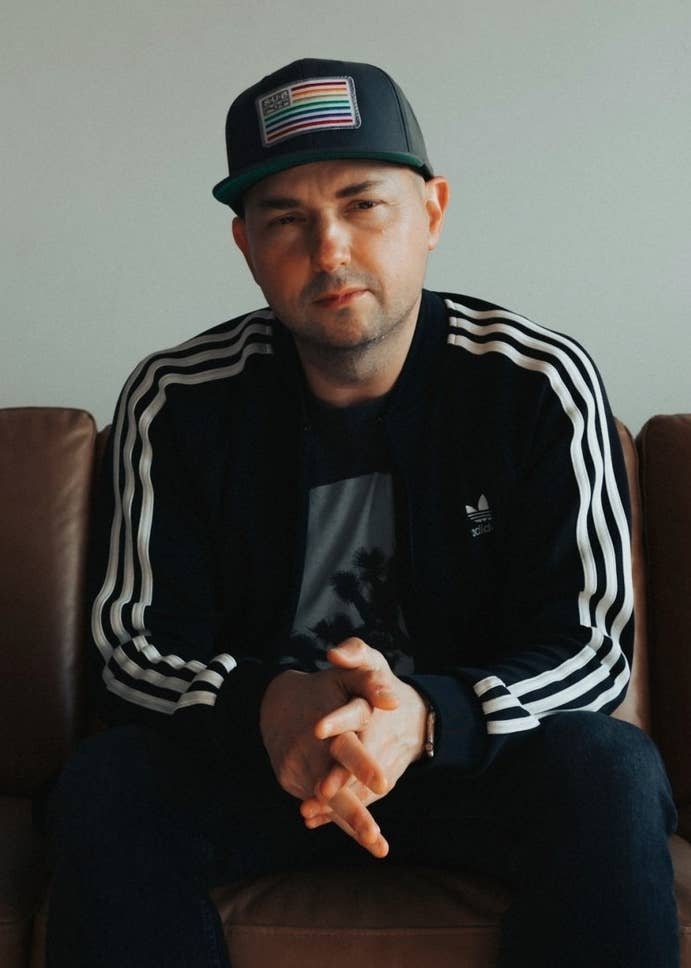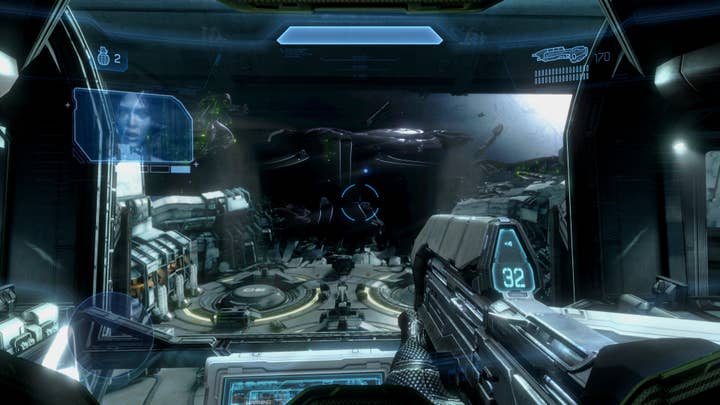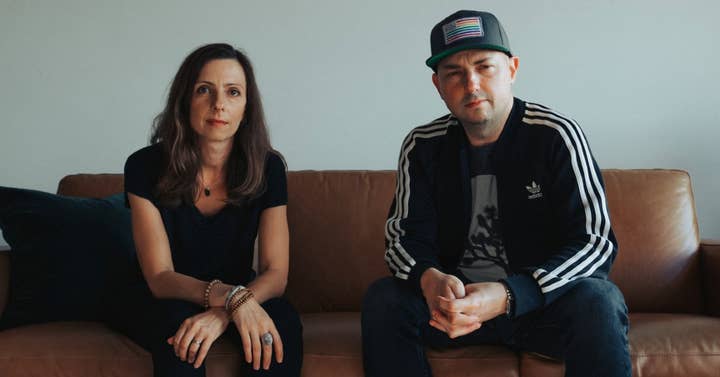Tencent-owned Team Kaiju is searching for the untapped fantasies of first-person shooters
Former Halo and Battlefield leads Scott Warner and Rosi Zagorcheva share more about TiMi Studio Group's expansion into AAA games
It's been more than a year since we learned Tencent had hired Halo 4 lead designer Scott Warner to lead a new Los Angeles-based office under its TiMi Studios business. And just a few months ago, TiMi announced it had also opened a Seattle studio to make AAA console games.
Now we know they are one and the same thing. And that thing is Team Kaiju.
'Kaiju' means 'strange beast' and that's what the studio hopes to be in the AAA space, creating games that shake up what is already a highly competitive genre: multiplayer first-person shooters. The team is currently working on a new IP for a live service game, and while details beyond that are scarce, Warner adds that: "Gaming has yet to address all the player fantasies we could enjoy in an FPS game."
That's probably true, but a little hard to fathom; there are military shooters covering every real-world conflict that comes to mind (as well as scores of fictional ones), open-world shooters set in far flung locations around the world, Wild West shooters, spy shooters, army shooters, sci-fi shooters, cartoon shooters, puzzle shooters -- heck, Far Cry Primal essentially turned the end of Upper Paleolithic Age into a shooter. What else can be left?

"I think there are always things left to do," Warner tells GamesIndustry.biz. "In my personal opinion, video games are the preeminent creative medium of the 21st century. We're in the 'silent film' era, as far as I'm concerned, in terms of all the different interactions, fantasies and everything we can realise.
So on the one hand, we can look at it and go, 'Haven't we already gone through all the well-trodden areas of fantasies that are popular in culture right now?' But then, just off the top of my head, where's your 'be an astronaut' FPS? Or Gearbox is doing their Borderlands and fantasy thing they're going to do. And what we're talking about is not even those things.
"The way we're looking at it is if you go through all our other mediums -- film, television, comics, music, books -- there are plenty of ideas that have yet to be realised in an interactive form that haven't happened for risk aversion reasons, technical capacity, and so on. Whatever the reason, there are so many other things to explore.
"Think about battle royale -- not even just the fantasy, but in terms of the modal exploration -- that's something we think about. When you're making multiplayer, you always think about modes, like domination, capture the flag, warzone, whatever. That wouldn't have seemed like something that was going to move the needle when you just say it out loud but it completely changed how players understood first-person shooters, multiplayer and their expectations in terms of mode.
"So there's a lot [of potential] but it requires more work and effort from us these days to try and come up with ideas that are going to address that thing when you look out there and think, 'Well, what else could there be?'"
Fortunately, much of the team has plenty of experience in creating AAA shooters. Warner himself, in addition to leading work on Halo 4, has worked on the Battlefield and Mercenaries series, while Team Kaiju's director of operations Rosi Zagorcheva was senior director of product development on Battlefield 4 and its many expansions, with additional experience on Star Wars Battlefront and Medal of Honor.
"The important thing for us is to make a welcoming game. We're confident we have a fantasy which is really appealing"
Rosi Zagorcheva, Team Kaiju
"We'll take all the experience the team has learned from making AAA shooters in the last decade and apply that to all the expectations that players are going to have when they learn the primary verb for [our game] is shooting," says Warner.
"Players expect the gun to feel a certain way, that they're able to acquire and aim at targets, that guns sound and feel a certain way, that they're an extension of the players themselves.... There are just so many things that have to happen under the hood to make the experience feel sort of baseline, cost of entry good for a person to enjoy a first-person shooter so that's where a lot of our experience will come into play."
Even with extensive experience and a deep understanding of the genre, breaking into the highly competitive AAA space is no easy task. We've seen attempts in recent years, from V1 Interactive's ill-fated Disintegration (also made by former Halo devs) to the struggles of Cliff Blezsinski's LawBreakers. Warner acknowledges this, although counters with the rise of Overwatch, Valorant, Fortnite, PUBG, Escape From Tarkov, and Ark: Survival Evolved.
"There's plenty of new things that have reached millions of people," he says. "Some of them are novel and new ideas, some of them are evolutions of form, and some are just trying to service a customer base. Like, is there something the Counter-Strike audience really wants but isn't getting from their current experience? Can you make some changes to that and find something new they'd be interested in?"
Team Kaiju has stated that, like almost any title in development these days, it will built around "a community of players who will be encouraged to give feedback as a positive tool to improve the game." But when it comes to the shooter genre, perhaps more so than others, this comes with risks: competitive multiplayer shooters have been known to attract the more toxic elements of the gaming community. How do you design something built around a community without enabling those players to mistreat others?

Warner says there are different ways to either minimise the degree of toxicity, or eliminate it completely: "You can go from 'We're completely open, we don't care, toxicity is just an accepted part of the type of game we make' or you can go all the way on the other side of things. It's a strange example, but Journey removes it all. You're interacting with someone but you have a limited possibility space in which to do so, [that's] quite a bit different to something like Call of Duty. Or you go somewhere towards the middle; Overwatch is pretty innovative in changing the perspective of players from a very brutal way of evaluating their performance -- who got the most kills? -- to here is how you performed against yourself, and here's what made you feel like you were having a great game. Having a game that's entirely about performance around a team and understanding how you fit within that team."

Zagorcheva adds: "The important thing for us is to make a welcoming game. We're confident we have a fantasy which is really appealing. We're leaning into understanding the people, our audience. The things our players are interested in, a version of this fantasy within the context of a first-person shooter, what motivates them, what accomplishments or actions or things to do in a game drive them, and finding an interest overlap between the different motivations of players that can take us to a really broad place. For us to do that, it has to be a welcoming game and appealing to the people that may not be in that initial group."
While Team Kaiju will be based across Seattle and Los Angeles, the team is currently fully remote and will remain a hybrid when people eventually return to offices. Zagorcheva says this has been an advantage in attracting talent, and ensuring the studio is up to speed -- even before there is a physical studio.
"We believe we can be creative, and we've been able to do this for many months now," she says. "We can make a game, that's shaping up to be really fun so far, remotely. This distributed way of working is a way for us to actually get people to join the studio that may not have chosen to do that had they needed to go to Seattle or LA. We get great talent from all over the world.
"What we have to do is work out how we do this well when we get a chance to go back to the office, when we have people in the office and some in their homes or somewhere else. There's a lot of thought around our culture, our norms for how we work together. [For us,] there is no difference between a person sitting in the office and a person sitting in their bedroom, so that those people don't feel any different in their opportunity to contribute and collaborate and make a good game. We're going to figure out things and learn. I think a lot of the games and tech industries are going through the same period of figuring out how to create things together when we're not in the same place. I believe this is the way of the future and we're going to get better at doing this in intentionally flexible ways that enable us to get the most out of a creative team."
At present, the team stands at around 20 developers. Naturally, aiming for the AAA market means the studio will need to grow but Zagorcheva says they "don't want to grow too big." She refers to the Dunbar Number -- the maximum point at which people can maintain social and collaborative relationships, believed to be around 100 to 250 and often cited as 150.
"If you go through all other mediums - film, television, comics, music, books - there are plenty of ideas that have yet to be realised in an interactive form"
Scott Warner, Team Kaiju
"We're fortunate to have the backing of TiMi, that gives us a lot of opportunities to do things in slightly different ways compared to what we're used to in the past," she says on scaling the studio.
This includes building a more diverse team. While Team Kaiju is currently lacking in that regard -- around 75% of staff are your typical white, male developers -- Zagorcheva says she and her team are committed to bringing in as many perspectives as possible.
"It's something I think about all the time. It's not only the morally, ethically right thing to do, there's also a business imperative if we're going after diverse audiences across the world," she says.
"The work we've really invested in so far has been making sure the studio we're building is actually an inclusive environment for any type of person. That comes down to psychological safety, that's something that's really important to us. It's important to create a space where we can all be our authentic selves, we can be who we are. We can share ideas and collaborate in new ways that aren't [affected] by the potential embarrassment of saying something inadequate or looking bad. That creates a space for differences to be welcomed."
Warner adds: "If our goal as a studio is originality, what better way to do that than to find different voices to contribute creatively to everything we're doing. My No.1 creative interest is to try and do things differently, make things differently, have something to present to people that represents different points of view. The best way to do that is to have different people contributing to [your work]."
Team Kaiju is not just aiming to bring something new to the shooter space, it has also been built to bring something new to the console and PC space in general -- namely, its Tencent-owned parent TiMi Studios. The company's output has been primarily mobile to date, with the exception of the Switch version of Pokémon Unite, so branching into AAA on more traditional platforms is a huge step.
"The strategy here is to associate TiMi with quality, and to get people in North America to look at TiMi as a division that can bring them experiences like the ones they know, like the quality of a Blizzard or an EA," Warner explains.
"The best way to do that is to make games that people care about, that they're going to talk about in communities, that are novel things they've never experienced before."

